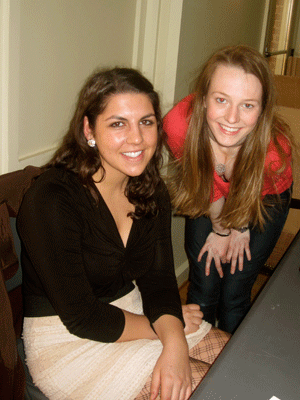Larson gives campus organizations 'megaphone'
Feb. 21, 2011
Bill Larson, a third year Washington and Lee law student and W&L graduate, knew he had to leave his mark on the university. “I took some time to consider how to improve W&L on a macro level,” said Larson. He saw a need to increase mental health activism on campus, which inspired him to create a campus-wide Mental Health Task Force.
The task force began working three weeks ago when Larson recruited juniors, John Grigsby, Lauren Ashley Tipton and Laura Steitz, to help in his efforts. Tipton is the President of Active Minds, an organization that educates students about mental health issues, while Grigsby and Steitz are both on the Peer Counseling Steering Committee. Peer counseling is available to all students, but is made especially accessible to first-years, who can have trouble orienting to life on a college campus.
 Secretary Michelle Coriell and President Lauren Ashley Tipton brainstorm ideas for their organization, Active Minds, in Elrod Commons. Photo: Becky Mickel |
Larson explained, “Any task force is an arm of the Executive Committee,” because the EC approves task force proposals and then expects a follow-up report from the students involved about two to three months later. All task force reports are made public on the EC’s website.
Larson said that the Mental Health Task Force is a joint initiative to examine the current status of mental health at W&L and to come up with ideas to increase awareness. Larson explained that when he was an undergraduate on campus, mental health was a topic that he and his friends had trouble discussing. However, he said, as people grow older, they feel more comfortable expressing their problems. Larson said this exposure encouraged him to examine mental health on the undergraduate level. The task force has met with Active Minds and Peer Counseling and has held meetings with faculty, advisors, Dr. Kirk Luder in the Counseling Center, and RA leadership.
“I think that mental health is the single most important issue on campus. It’s the next sexual assault,” Larson said.
The task force held an open session last Tuesday in Elrod Commons to allow students to address the task force with any comments or ideas about how to increase mental health awareness.
Junior Eric Gehman, President of End It, told the task force, “Washington and Lee is a place chuck full of possibilities.”
While End It has placed sexual assault at the forefront of student issues on campus, Gehman believes that mental health is an equally important issue that will only gain momentum once more students realize “Washington and Lee is a high-stakes, high-stress community where things can go wrong,” Gehman said.
The principal problem, Gehamn said, is that counseling resources and educational literature are difficult to find. He hopes that web navigation will be made easier after the task force’s investigation is complete.
While accessibility may need improvement, Steitz and Grigsby, who are both second-year peer counselors, are confident in the services that the Peer Counseling program offers.
“Because peer counseling addresses eating disorders, substance abuse, anxiety, depression, coming out--just to name a few--I don’t think that mental health is under-recognized, but it’s definitely under-addressed,” Grigsby said.
Steitz thinks that students are concerned with maintaining the “W&L face,” which is why they may be wary of admitting to mental health problems. However, both are eager to analyze the task force’s findings and to implement new strategies into peer counselor training.
Tipton believes that many students are dedicated to the cause and that interest varies from freshmen to seniors, women to men, and those who suffer from mental health problems to those who know people who are suffering.
“The great thing about Active Minds is that we can actually empower students to deal with mental health. We can encourage them not to comply with the status quo,” Tipton said.
Tipton feels especially called to promote mental health because she is a neuroscience major who hopes to become a psychiatrist.
“This might sound basic, but the most important organ in the world is your brain. Our school prides itself on excellence, but for some reason, we’re exceptionally sub-par when it comes to addressing mental health issues…I can't wrap my head around it…what happened to that drive for excellence?” Tipton said.
Active Minds receives educational resources, like brochures, posters, and speaker contacts from their national base and has been eligible since last fall to apply for EC budget allocations. All representatives on the taskforce are hopeful that their findings will increase EC budget allocations for their respective organizations in future sessions.
Want to see when Washington and Lee first addressed mental health issues?
| Regional events calendar |
Local government websites: |
Produced by Washington and Lee digital journalism students.
![]()




